Related Research Articles
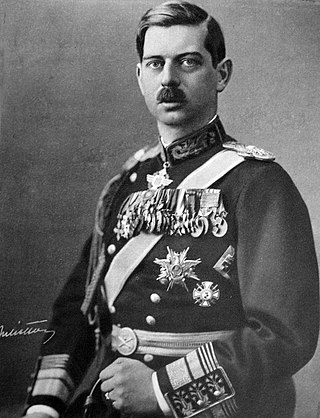
Carol II was the King of Romania from 8 June 1930 until his forced abdication on 6 September 1940. As the eldest son of Ferdinand I, he became crown prince upon the death of his grand-uncle, King Carol I, in 1914. He was the first of the Hohenzollern kings of Romania to be born in the country; both of his predecessors had been born in Germany and came to Romania only as adults. As such, he was the first member of the Romanian branch of the Hohenzollerns who spoke Romanian as his first language, and was also the first member of the royal family to be raised in the Orthodox faith.
The Forsyte Saga, first published under that title in 1922, is a series of three novels and two interludes published between 1906 and 1921 by the English author John Galsworthy, who won the 1932 Nobel Prize in Literature. They chronicle the vicissitudes of the leading members of a large upper-middle-class English family that is similar to Galsworthy's. Only a few generations removed from their farmer ancestors, its members are keenly aware of their status as "new money". The main character, the solicitor and connoisseur Soames Forsyte, sees himself as a "man of property" by virtue of his ability to accumulate material possessions, but that does not succeed in bringing him pleasure.
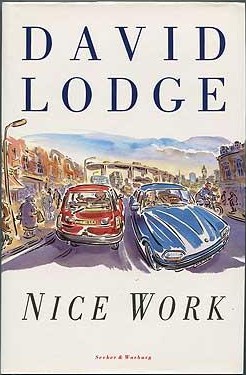
Nice Work is a 1988 novel by British author David Lodge. It is the final volume of Lodge's "Campus Trilogy", after Changing Places (1975) and Small World: An Academic Romance (1984). Nice Work won the Sunday Express Book of the Year award in 1988 and was also shortlisted for the Booker Prize.

An expatriate is a person who resides outside their native country.
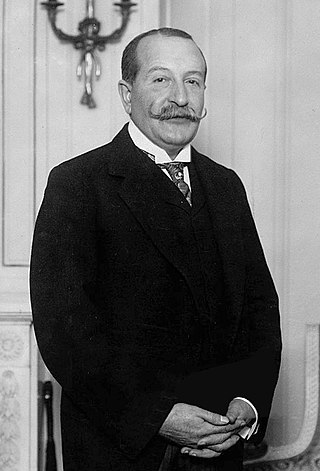
Take or Tache Ionescu was a Romanian centrist politician, journalist, lawyer and diplomat, who also enjoyed reputation as a short story author. Starting his political career as a radical member of the National Liberal Party (PNL), he joined the Conservative Party in 1891, and became noted as a social conservative expressing support for several progressive and nationalist tenets. Ionescu is generally viewed as embodying the rise of middle-class politics inside the early 20th century Kingdom of Romania, and, throughout the period, promoted a project of Balkan alliances while calling for measures to incorporate the Romanian-inhabited Austro-Hungarian regions of Transylvania, Banat and Bukovina. Representing his own faction inside the Conservative Party, he clashed with the group's leadership in 1907–1908, and consequently created and led his own Conservative-Democratic Party.

The Cișmigiu Gardens or Cișmigiu Park are a public park in the center of Bucharest, Romania, spanning areas on all sides of an artificial lake. The gardens' creation was an important moment in the history of Bucharest. They form the oldest and, at 14.6 hectares, the largest park in city's central area.
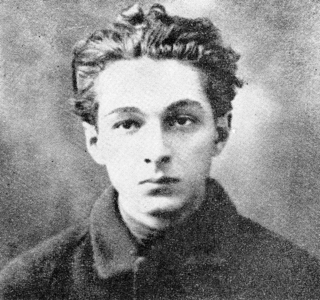
Ionel Teodoreanu was a Romanian novelist and lawyer. He is mostly remembered for his books on the themes of childhood and adolescence.
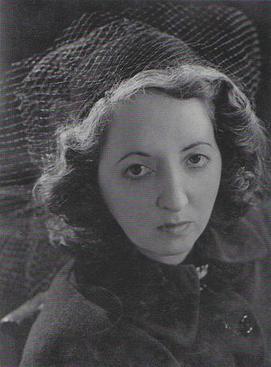
Olivia Mary Manning was a British novelist, poet, writer, and reviewer. Her fiction and non-fiction, frequently detailing journeys and personal odysseys, were principally set in the United Kingdom, Europe, and the Middle East. She often wrote from her personal experience, though her books also demonstrate strengths in imaginative writing. Her books are widely admired for her artistic eye and vivid descriptions of place.

Prince Barbu Alexandru Știrbey was 30th Prime Minister of the Kingdom of Romania in 1927.

George Ambrose Lloyd, 1st Baron Lloyd, was a British Conservative politician and colonial administrator who was strongly associated with the "Diehard" wing of the party. From 1937 to 1941, he was chairman of the British Council in which capacity he sought to ensure support for Britain's position during the Second World War.

The InterContinental Athénée Palace Bucharest is a historic luxury hotel in Bucharest, Romania, originally opened in 1914. It was arguably Europe's most notorious den of spies in the years leading up to World War II, and only slightly less so during the Cold War.

Many fictional depictions of the Roma in literature and art present Romanticized narratives of their supposed mystical powers of fortune telling, and their supposed irascible or passionate temper which is paired with an indomitable love of freedom and a habit of criminality. Critics of how the Roma have been portrayed in popular culture point out similarities to portrayals of Jewish people, with both groups stereotyped negatively as wandering, spreading disease, abducting children, and violating and murdering others.
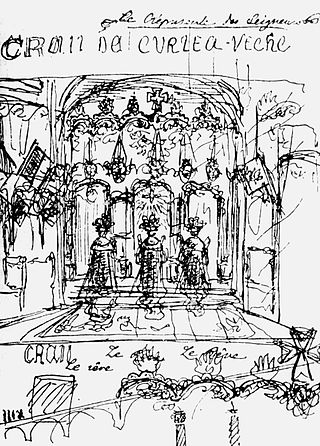
Craii de Curtea-Veche is a novel by the inter-war Romanian author Mateiu Caragiale. Published in 1929, it took the author more than two decades to complete, and constituted his only major work. It has been translated into English by Sean Cotter as Rakes of the Old Court (2021) and by Cristian Baciu as Gallants of the Old Court (2011).

Officers and Gentlemen is a 1955 novel by the British novelist Evelyn Waugh.

Fortunes of War is a 1987 BBC television adaptation of Olivia Manning's cycle of novels Fortunes of War. It stars Kenneth Branagh as Guy Pringle, lecturer in English Literature in Bucharest during the early part of the Second World War, and Emma Thompson as his wife Harriet. Kenneth Branagh and Emma Thompson met filming the TV series and married in real life. Other cast members included Ronald Pickup, Robert Stephens, Alan Bennett, Philip Madoc and Rupert Graves.
Reginald Donald Smith was a British teacher and lecturer, BBC radio producer, and possible communist spy. He was the model for the character of Guy Pringle in the novel sequence Fortunes of War written by his wife, Olivia Manning.
In British history, a remittance man was an emigrant, often from Britain to a British colony, who was supported by regular payments from home on the expectation that he would stay away.
John Peter Tydeman OBE was an English producer of radio and director of theatre plays. He was responsible for commissioning and directing the early plays of Caryl Churchill, Joe Orton, Tom Stoppard and Sue Townsend.

The Great Fortune is a novel by English writer Olivia Manning first published in 1960. It forms the opening part of a six-part novel series called Fortunes Of War. The Fortunes Of War series itself is split into two trilogies, The Balkan Trilogy and The Levant Trilogy. The novels tell an unfolding story of how the Second World War impacts on the lives of a group of British expatriates.
Sugar Street, first published in 1957, is the third novel in the Cairo Trilogy by Egyptian novelist Naguib Mahfouz. In this third novel, the main character Kamal, the youngest son of Ahmad 'Abd al-Jawad who is a young child in the first and a student in the second, is a teacher.
References
- ↑ Stevenson, Randall (10 November 2005). Randall Stevenson, The Oxford English Literary History: Volume 12: The Last of England?, p 415. ISBN 978-0-19-158884-6. Archived from the original on 2017-03-01. Retrieved 2016-11-06.
- ↑ Review: Olivia Manning’s The Great Fortune, 26 April 2011 Archived 10 October 2014 at the Wayback Machine Accessed 8 April 2014
- ↑ Cambridge University Institute of Continuing Education, "World and time: Professor Pinkrose", 27 April 2010 Archived 8 April 2014 at the Wayback Machine . Accessed 8 April 2014
- ↑ Burgess, Anthony (1984), 99 Novels: The Best in English since 1939 ; New York: Summit Books, pg 76.
- ↑ Gillian Reynolds, "Poignant echoes of a world at war", The Telegraph, 26 February 2008 Archived 24 February 2017 at the Wayback Machine . Accessed 8 April 2014